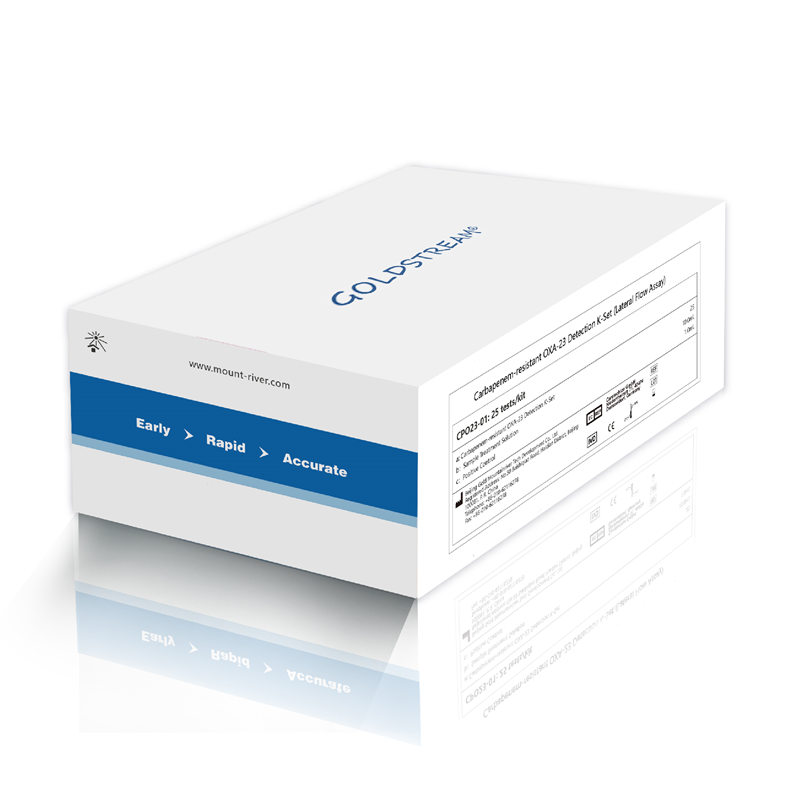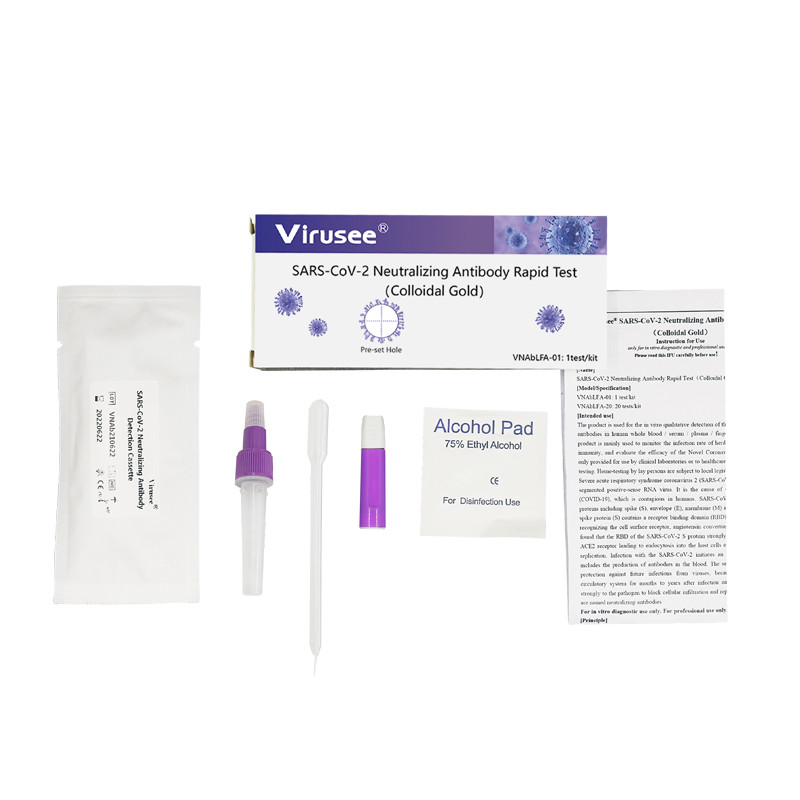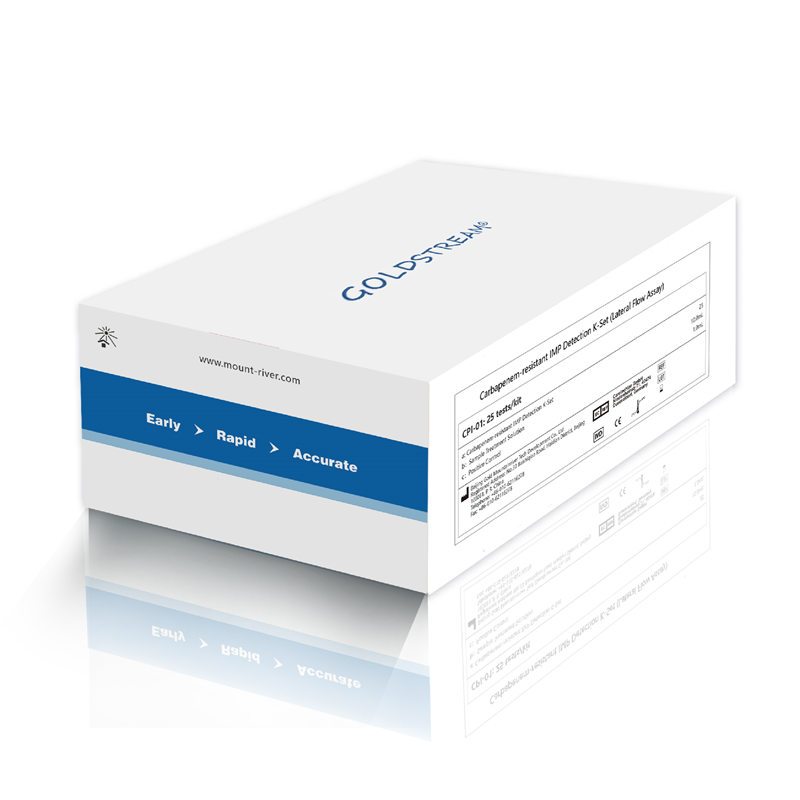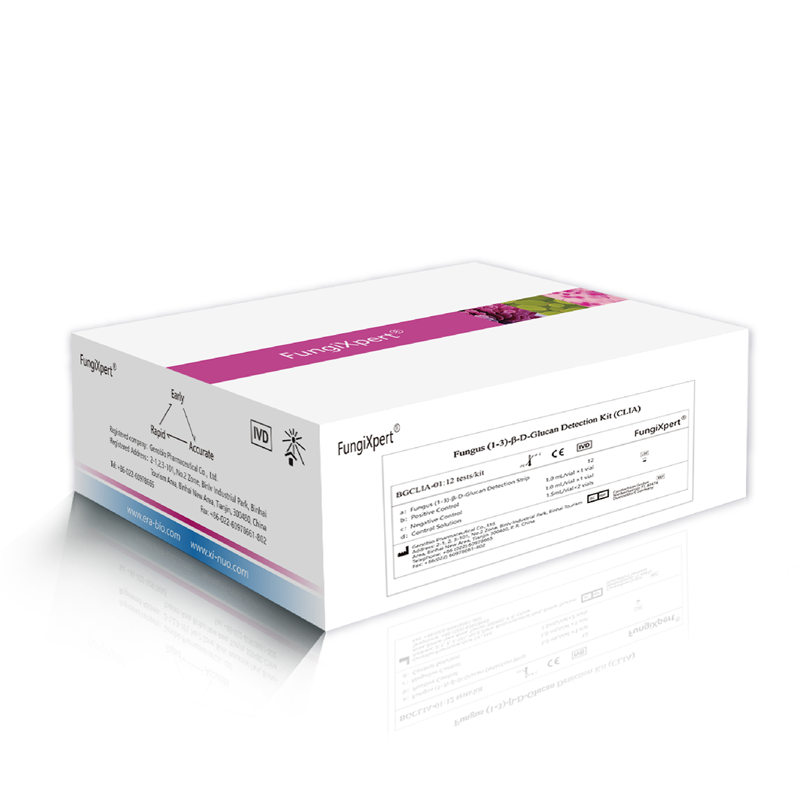Professional Design CRE VIM test - Carbapenem-resistant OXA-23 Detection K-Set (Lateral Flow Assay) – Genobio
Professional Design CRE VIM test - Carbapenem-resistant OXA-23 Detection K-Set (Lateral Flow Assay) – Genobio Detail:
Product Introduction
The Carbapenem-resistant OXA-23 Detection K-Set (Lateral Flow Assay) is an immunochromatographic test system intended for the qualitative detection of OXA-23-type carbapenemase in bacterial colonies. The assay is a prescription-use laboratory assay which can aid in the diagnosis of OXA-23-type carbapenem resistant strains.

Characteristics
|
Name |
Carbapenem-resistant OXA-23 Detection K-Set (Lateral Flow Assay) |
|
Method |
Lateral Flow Assay |
|
Sample type |
Bacterial colonies |
|
Specification |
25 tests/kit |
|
Detection time |
10-15 min |
|
Detection objects |
Carbapenem-resistant Enterobacteriaceae (CRE) |
|
Detection type |
OXA-23 |
|
Stability |
The K-Set is stable for 2 years at 2°C-30°C |

Advantage
- Rapid
Obtain result within 15 min, 3 days earlier than traditional detection methods - SOXA-23le
Easy to use, ordinary laboratory staff can operate without training - Accurate
High sensitivity and specificity
Low detection limit: 0.10 ng/mL
Able to detect most of the common subtypes of OXA-23
- Intuitive result
There is no need for calculation, visual reading result - Economic
Product can be transported and stored at room temperature, reducing costs
The importance of CRE test
CRE (Carbapenem-resistant Enterobacteriaceae) are a family of germs that are difficult to treat because they are highly resistant to antibiotics. CRE infections usually happen to patients in hospitals, nursing homes, and other healthcare settings. Patients whose care requires devices like ventilators (breathing machines), urinary (bladder) catheters, or intravenous (vein) catheters, and patients who are taking long courses of certain antibiotics are most at risk for CRE infections.
Some CRE bacteria have become resistant to most available antibiotics. Infections with these germs are very difficult to treat, and can be deadly—one report cites they can contribute to death in up to 50% of patients who become infected.
To prevent the further spread of CRE, healthcare provides should
- Stay aware of CRE infection rates. Ask if a patient has received medical care somewhere else, including another country.
- Place patients that have been infected with CRE on Contact Precautions. Isolation is necessary.
- Perform hand hygiene – use alcohol-based hand rub or wash hand with soap and water before and after contact with patient or their environment
- Alert the receiving facility when you transfer a CRE patient, and find out when a patient with CRE transfers into your facility
- Make sure labs immediately alert clinical and infection prevention staff when CRE are identified
- Prescribe and use antibiotics wisely
- Discontinue devices like urinary catheters immediately when no longer necessary
……
Rapidly identifying patients with CRE and isolating them from other ICU patients when appropriate, using antibiotics reasonably, and reducing invasive device use are important in preventing CRE transmission. CRE rapid test is a necessary prerequisite for the implementation of these methods, which makes it a crucial part of clinical CRE management
OXA-23-type carbapenemase
Carbapenemase refers to a type of β-lactamase that can at least significantly hydrolyze imipenem or meropenem, including A, B, D three types of enzymes classified by Ambler molecular structure. Class D, such as OXA-type carbapenemase, were frequently detected in Acinetobacteria. Recent years, there have been reports of hospitalization caused by OXA-23, i.e. Oxacillinase-23-like beta-lactamase. 80% of domestic carbapenem-resistant Acinetobacteria baumannii produce OXA-23-type carbapenemase, which makes the clinical treatment very difficult.
Operation
- Add 5 drops of sample treatment solution
- Dip bacterial colonies with a disposable inoculation loop
- Insert the loop into the tube
- Add 50 μL to the S well, wait for 10-15 minutes
- Read the result

Order Information
|
Model |
Description |
Product code |
|
CPO23-01 |
25 tests/kit |
CPO23-01 |
Product detail pictures:

Related Product Guide:
Professional Design CRE VIM test - Carbapenem-resistant OXA-23 Detection K-Set (Lateral Flow Assay) – Genobio , The product will supply to all over the world, such as: , , ,




